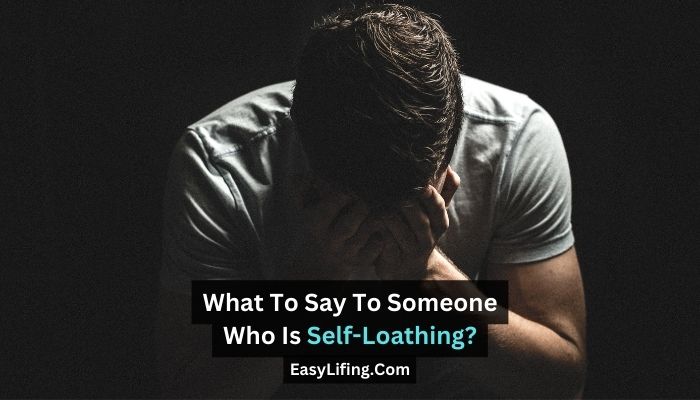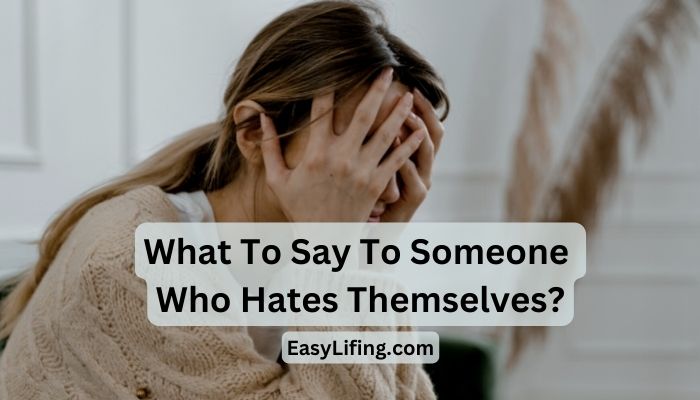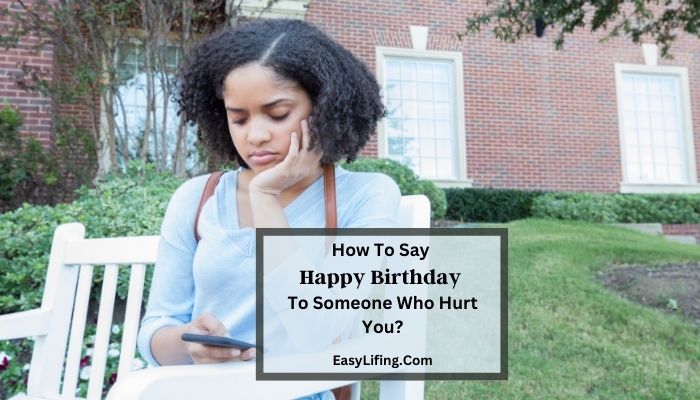What To Say To Someone Who Is Self-Loathing?
If you find yourself with a self-loathing friend, don’t feel any irritation. Trust me. He needs you. Self-loathing is a term that destroys peoples from the inside, which sometimes lead to committing suicide. But it is hard to know what to say to someone who is a self-loathing person.
Don’t worry! Just put a smile on your face every time you see him. Give him warming welcome by asking him, “how is he doing, and what would he like to talk about.” A simple smile and kind words can go a long way in helping him feel better. Let him know that you are there to listen and to help.
Let’s learn about a few other things to help a self-Loathing person, how to respond to him, and ways to turn self-hating into self-compassion.
Read Also
How Do I Cheer Up My Sister Who Recently Had A Breakup
How Do You Deal With A Bossy Older Sister?
What Can You Say to Say A Self-Loathing Person?
If you’re trying to support someone who is struggling with self-loathing, it can be challenging to know what to say. However, there are some right words you can say that may help encourage self-compassion and self-care. Here are a few examples:
“Hard time doesn’t stay for a long. You are loved and valued.” This simple statement can be powerful for someone who is struggling with self-loathing. Reminding them that they are loved and valued can help them feel more connected and supported.
“You are doing the best you can. Let’s redecorate everything together” Sometimes, people who struggle with self-loathing feel like they are not doing enough or not good enough. Reminding them that they are doing the best they can helps them feel more self-compassionate.
“I’m here for you. Just tell me what is bothering you” Letting someone know that you are there for them and willing to listen can help them feel less alone and more supported.
“It’s ok to make a mistake. The people who work hard will definitely make mistakes. Now, what can I do to help? Of course, I can’t see you feel down like this” Sometimes, people who are struggling with self-loathing may not know what they need or how to ask for help. Offering to support them in specific ways can be helpful.
“You have to think about yourself. As long as you keep hating yourself, the world will ignore you as useless. You deserve to take care of yourself.” Encouraging someone to practice self-care and prioritize their own needs can be a powerful way to combat self-loathing and build self-compassion.
Remember, everyone’s journey is unique, and what works for one person may not work for another. It’s important to listen to your loved one and support them in the ways that feel most helpful to them.
How Do You Respond to Someone With A Lot of Self-Hate?
If someone you care about is struggling with self-hate, it can be challenging to know how to respond in a way that is supportive and helpful. Here are some tips for responding to someone with a lot of self-hate:
- Listen actively: If someone is sharing their struggles with self-hate with you, it’s important to listen actively and without judgment. Show empathy and validate their feelings, even if you don’t fully understand what they are going through.
- Avoid minimizing their feelings: Statements like “It’s not that bad” or “You’re overreacting” can be dismissive and unhelpful. Instead, acknowledge that their feelings are real and valid.
- Encourage self-compassion: Self-compassion is the practice of treating oneself with kindness, understanding, and forgiveness. Encouraging your loved one to practice self-compassion can help them develop a more positive relationship with themselves.
- Avoid criticizing or blaming: Criticizing or blaming your loved one for their self-hate is not helpful and can make them feel worse. Instead, focus on supporting them and helping them find ways to cope with their feelings.
- Offer support and resources: Let your loved one know that you are there for them and willing to help in whatever way you can. You may also want to offer resources, such as therapy, support groups, or self-help books, that could be helpful for them.
How to Turn Self-hatred into Self-Compassion?
It can be difficult to know how to support a loved one who struggles with self-loathing in changing their self-hatred into self-compassion. Self-hatred can be a complicated and difficult issue with no one-size-fits-all solution. However, you can try self-hate coping mechanisms and strategies that can help your loved one move towards a more compassionate relationship with themselves.
Here are some ways to help turn self-hatred into self-compassion:
Encourage Self-Awareness
Help your loved one become more aware of their negative self-talk and the ways in which they criticize themselves. By recognizing these patterns, they can start to challenge and replace them with more positive and self-compassionate thoughts.
Practice Mindfulness
Mindfulness is the practice of being present and fully engaged in the current moment. Encourage your loved one to practice mindfulness techniques, such as meditation or deep breathing, to help them become more grounded and present in their body.
Challenge Negative Beliefs
Help your loved one challenge their negative beliefs about themselves by asking questions like, “Is this thought true?” or “What evidence do you have to support this belief?” By questioning these negative thoughts, your loved one may be able to replace them with more positive and self-compassionate beliefs.
Focus On Strengths And Accomplishments
Encourage your loved one to focus on their strengths and accomplishments rather than their perceived weaknesses and failures. Help them recognize their positive qualities and celebrate their accomplishments, no matter how small.
Seek Professional Help
Sometimes, self-loathing can be a deeply ingrained issue that requires professional help to overcome. Encourage your loved one to seek therapy or counseling to help them work through their self-hatred and develop more self-compassion.
Remember that turning self-hatred into self-compassion is a journey, and it may not happen overnight. Be patient and supportive of your loved one as they work towards healing and developing a more positive relationship with themselves. By using these coping mechanisms and strategies, your loved one can begin to break free from their self-loathing and move towards a more self-compassionate future.
Conclusion
Supporting someone who struggles with self-loathing can be challenging, but it’s important to approach the situation with empathy and understanding. Listening actively, avoiding criticism, and encouraging self-compassion are all key ways to respond to someone with a lot of self-hate.
Additionally, helping your loved one develop coping mechanisms, such as mindfulness and challenging negative beliefs, can be powerful tools for turning self-hatred into self-compassion. Remember that everyone’s journey is unique, and there is no one-size-fits-all solution.
With patience, support, and the right tools, your loved one can overcome their self-loathing and develop a more positive relationship with themselves.
If you think the process I described helped you, then let’s make a friendship. You can follow us on our social media Facebook, Twitter, and Pinterest, so that whenever we post new Easylifing ways. That appears on your timeline.







